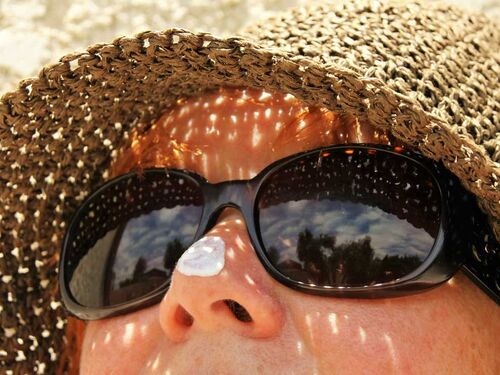Does sunscreen cause skin cancer?
Based on Science
Sunscreen use is not linked to higher rates of any type of cancer.
Last update July 5, 2023
Sunscreens are tested for safety.
In the United States, sunscreens are regulated as over-the-counter products by the Food and Drug Administration (FDA). This means that active ingredients must be studied for safety and effectiveness before the products can legally be sold. The FDA has not found evidence that common active sunscreen ingredients increase the risk of any type of cancer. An analysis published in 2011 looked at studies dating back to the 1960s and also found no negative health effects of sunscreen use.
Skin cancer is the most common type of cancer.
It is true that skin cancer is fairly common and and rates are going up despite the availability and widespread use of sunscreens. If you do not use enough sunscreen, you will not be fully protected against ultraviolet (UV) radiation. Skin cancer found in older adults may be linked to UV exposure early in life before effective sunscreens were widely available. And someone who uses sunscreen regularly could develop skin cancer anyway due to other factors such as genetic risk. Other ways to reduce skin cancer risk are also important, such as wearing protective clothing, seeking shade, and avoiding the sun during mid-day.
Sunscreen can reduce the risk of developing skin cancer.
Careful studies have shown that the regular use of broad spectrum sunscreen can reduce the chance of skin cancer. One of the best examples is a large study done in a town in Australia where it is very sunny. The researchers studied a group of people at high risk of developing skin cancer. Half of the people used sunscreen every day for 4 years. The other half used sunscreen when they wanted to or not at all. By the end of the study, significantly fewer of the daily sunscreen users had developed squamous cell carcinoma, one type of skin cancer.
That study started in the 1990s, and the researchers have continued to follow the participants after it ended. Over time, they have found that there was a 40% lower risk of squamous cell cancer as well as fewer cases of melanoma and basal cell carcinoma among people who used daily sunscreen in the study. This shows that regular use of broad spectrum sunscreen reduces the risk of skin cancer, including melanoma.
ADDITIONAL RESOURCES
More like this
Discover
Events
Right Now & Next Up
Stay in the loop with can’t-miss sessions, live events, and activities happening over the next two days.
NAS Building Guided Tours Available!
Participate in a one-hour guided tour of the historic National Academy of Sciences building, highlighting its distinctive architecture, renowned artwork, and the intersection of art, science, and culture.




